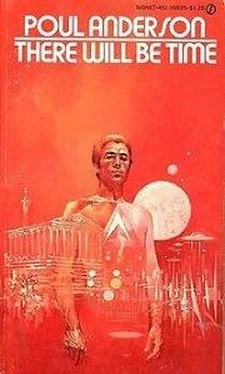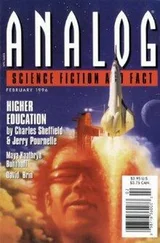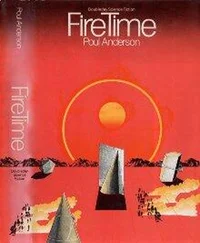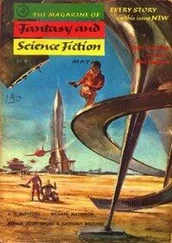Poul Anderson - There Will Be Time
Здесь есть возможность читать онлайн «Poul Anderson - There Will Be Time» весь текст электронной книги совершенно бесплатно (целиком полную версию без сокращений). В некоторых случаях можно слушать аудио, скачать через торрент в формате fb2 и присутствует краткое содержание. Год выпуска: 1972, Издательство: Doubleday, Жанр: Фантастика и фэнтези, на английском языке. Описание произведения, (предисловие) а так же отзывы посетителей доступны на портале библиотеки ЛибКат.
- Название:There Will Be Time
- Автор:
- Издательство:Doubleday
- Жанр:
- Год:1972
- ISBN:нет данных
- Рейтинг книги:5 / 5. Голосов: 1
-
Избранное:Добавить в избранное
- Отзывы:
-
Ваша оценка:
- 100
- 1
- 2
- 3
- 4
- 5
There Will Be Time: краткое содержание, описание и аннотация
Предлагаем к чтению аннотацию, описание, краткое содержание или предисловие (зависит от того, что написал сам автор книги «There Will Be Time»). Если вы не нашли необходимую информацию о книге — напишите в комментариях, мы постараемся отыскать её.
Nominated for Hugo Award for Best Novel in 1973.
There Will Be Time — читать онлайн бесплатно полную книгу (весь текст) целиком
Ниже представлен текст книги, разбитый по страницам. Система сохранения места последней прочитанной страницы, позволяет с удобством читать онлайн бесплатно книгу «There Will Be Time», без необходимости каждый раз заново искать на чём Вы остановились. Поставьте закладку, и сможете в любой момент перейти на страницу, на которой закончили чтение.
Интервал:
Закладка:
“Some of that was unavoidable, like accepting an invitation,” he told me. “And once in a while, like every man regardless of how thoroughly married, I wanted to drift around on my own for part of a day. But mainly, you realize, I’d go uptime. I didn’t — I don’t know what good it might do, but I’ve got this feeling of obligation to uncover the truth. So first I’d project myself to Istanbul, where I kept a false identity with a fat bank account. There/then I’d fly to whatever part of the world was indicated, and head futureward, and continue my study of the Maurai Federation and civilization, its rise, glory, decline, fail, and aftermath.”
Twilight stole slow across the island. Beneath its highest hill, land lay darkling save where firefly lanterns glowed among the homes of sea ranchers; but the waters still glimmered. White against a royal blue which arched westward toward Asia, seen through the boughs of a pine which a hundred years of weather had made into a bonsai, Venus gleamed. On the verandah of Carelo Keajimu’s house, smoke drifted fragrant from a censer. A bird sat its perch and sang that intricate, haunting repertoire of melodies for which men had created it; yet this bird was no cageling, it had a place in the woods.
The old man murmured: “Aye, we draw to an end. Dying hurts. Nonetheless the forefathers were wise who in their myths made Nan coequal with Lesu. A thing which endured forever would become unendurable. Death opens a way, for peoples as well as for people.”
He fell silent where he knelt beside his friend, until at last he said: “What you relate makes me wonder if we did not stamp our sigil too deeply.”
(“I’d followed his life,” Havig told me. “He began as a brilliant young philosopher who went into statecraft. He finished as an elder statesman who withdrew to become a philosopher. Then I decided he could join you, as one of the two normal-time human beings I dared trust with my secret.
(“You see, I’m not wise. I can skim the surface of destiny for information; but can I interpret, can I understand? How am I to know what should be done, or what can be done? I’ve scuttled around through a lot of years; but Carelo Keajimu lived, worked, thought to the depths of ninety unbroken ones. I needed his help.”)
“That is,” Havig said, “you feel that, well, one element of your culture is too strong, at the expense of too much else, in the next society?”
“From what you have told me, yes.” His host spent some minutes in rumination. They did not seem overly long. “Or, rather, do you not have the feeling of a strange dichotomy uptime, as you say … between two concepts which our Maurai ideal was to keep in balance?”
Science, rationality, planning, control. Myth, the liberated psyche, man an organic part of a nature whose rightness transcends knowledge and wisdom.
“It seems to me, from what you tell, that the present over-valuation of machine technology is a passing rage,” Keajimu said. “A reaction, not unjustified. We Maurai grew overbearing. Worse, we grew self-righteous. We made that which had once been good into an idol, and thereby allowed what good was left to rot out of it. In the name of preserving cultural diversity, we tried to freeze whole races into shapes which were at best merely quaint, at worst grotesque and dangerous anachronisms. In the name of preserving ecology, we tried to ban work which could lay a course for the stars. No wonder the Ruwenzorya openly order research on a thermonuclear powerplant! No wonder disaffection at home makes us impotent to stop that!”
Again a quietness, until he continued: “But according to your report, Jack my friend, this is a spasm. Afterward the bulk of mankind will reject scientism, will reject science itself and only keep what ossified technology is needful to maintain the world, They will become ever more inward-turning, contemplative, mystical; the common man will look to the sage for enlightenment, who himself will look into himself. Am I right?”
“I don’t know,” Havig said. “I have that impression, but nothing more than the impression. Mostly, you realize, I don’t understand so much as the languages. One or two I can barely puzzle out, but I’ve never had the time to spare for gaining anything like fluency. It’s taken me years of lifespan to learn what little I have learned about you Maurai. Uptime, they’re further removed from me.”
“And the paradox is deepened,” Keajimu said, “by the contrasting sights you have seen. In the middle of a pastoral landscape, spires which hum and shimmer with enigmatic energies. Noiseless through otherwise empty skies glide enormous ships which seem to be made less of metal than of force. And … the symbols on a statue, in a book, chiseled across a lintel, revealed by the motion of a hand … they are nothing you can comprehend. You cannot imagine where they came from. Am I right?”
“Yes,” Havig said miserably. “Carelo, what should I do?”
“I think you are at a stage where the question is, What should I learn?”
“Carelo, I, I’m a single man trying to see a thousand years. I can’t! I just, well, feel this increasing doubt … that the Eyrie could possibly bring forth those machine aspects … Then what will?”
Keajimu touched him, a moth-wing gesture. “Be calm. A man can do but little. Enough if that little be right.”
“What’s right? Is the future a tyranny of a few technic masters over a humankind that’s turned lofty-minded and passive because this world holds nothing except wretchedness? If that’s true, what can be done?”
“As a practical politician, albeit retired,” Keajimu said with that sudden dryness which could always startle Havig out of a mood, “I suspect you are overlooking the more grisly possibilities. Plain despotism can be outlived. But we Maurai, in our concentration on biology, may have left a heritage worse than the pain it forestalls.”
“What?” Havig tensed on his straw mat.
“Edged metal may chop firewood or living flesh,” Keajimu declared. “Explosives may clear away rubble or inconvenient human beings. Drugs — well, I will tell you this is a problem that currently troubles our government in its most secret councils. We have chemicals which do more than soothe or stimulate. Under their influence, the subject comes to believe whatever he is told. In detail. As you do in a dream, supplying every necessary bit of color or sound, happiness or fear, past or future.”
“To what extent dare we administer these potions to our key troublemakers?”
“I am almost glad to learn that the hegemony of the Federation will go under before this issue becomes critical. The guilt cannot, therefore, be ours.” Keajimu bowed toward Havig. “But you, poor time wanderer, you must think beyond the next century. Come, this evening know peace. Observe the stars tread forth, inhale the incense, hear the songbird, feel the breeze, be one with Earth.”
I sat alone over a book in my cottage in Senlac, November 1969. The night outside was brilliantly clear and ringingly cold. Frostflowers grew on my windowpanes.
A Mozart symphony lilted from a record player, and the words of Yeats were on my lap, and a finger or two of Scotch stood on the table by my easy chair, and sometimes a memory crossed my mind and smiled at me. It was a good hour for an old man.
Knuckles thumped the door. I said an uncharitable word, hauled my body up, constructed excuses while I crossed the rug. My temper didn’t improve when Fiddlesticks slipped between my ankles and nearly tripped me. I only kept the damn cat because he had been Kate’s. A kitten when she died, he was now near his ending — As I opened the door, winter flowed in around me. The ground beyond was not snow-covered, but it was frozen. Upon it stood a man who shivered in his inadequate topcoat. He was of medium height, slim, blond, sharp-featured. His age was hard to guess, though furrows were deep in his face.
Читать дальшеИнтервал:
Закладка:
Похожие книги на «There Will Be Time»
Представляем Вашему вниманию похожие книги на «There Will Be Time» списком для выбора. Мы отобрали схожую по названию и смыслу литературу в надежде предоставить читателям больше вариантов отыскать новые, интересные, ещё непрочитанные произведения.
Обсуждение, отзывы о книге «There Will Be Time» и просто собственные мнения читателей. Оставьте ваши комментарии, напишите, что Вы думаете о произведении, его смысле или главных героях. Укажите что конкретно понравилось, а что нет, и почему Вы так считаете.












